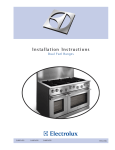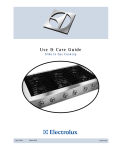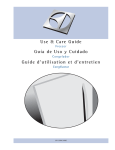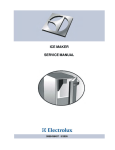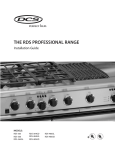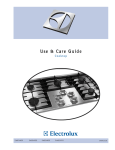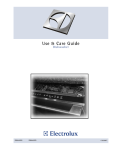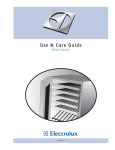Download Electrolux E36GF76GPS Use & care guide
Transcript
E30GF74GPS E36GF75GPS E36GF76GPS 318201761 2 Finding Information READ AND SAVE THESE INSTRUCTIONS NO TE NOTE Installer: Leave instructions with owner. Owner: Read your range Use & Care guide. It contains important safety information for operating this appliance. It also has many suggestions for getting the best results from your appliance. Read all instructions before installing the range. For your safety, please read and observe all safety instructions. This guide will help you anticipate all installations connections. QUESTIONS For toll-free telephone support in the U.S. and Canada: 1-877- 4ELECTROLUX (1-877-435-3287) For online support and Internet product information: www.electroluxusa.com ©2007 Electrolux Home Products, Inc. Post Office Box 212378, Augusta, Georgia 30917, US All rights reserved. Printed in the USA Finding Information TABLE OF CONTENTS Please Read And Save This Guide .................... 2 Questions .......................................................... 2 Table Of Contents ............................................. 3 Safety ..................................................................... 4 Important Safety Instructions ............................... 4 Definitions ........................................................... 4 Safety Precautions ........................................... 5 Preparing for Installation ................................... 7 Verifying Package Contents ................................ 7 Gas/Electric Requirement Table............................... 7 Electrical Power Supply Requirements .................. 8 Gas/Electric Connection Rough-In ..................... 9 Cabinet/Countertop Preparation .......................... 10 General Dimensions ........................................ 11 Wood/Composite Overlay Installation...................... 13 Installing Anti-Tip Bracket ...................................... 14 Installing the 36” Range Optional Backguard......... 15 Removing Oven Door.......................................... 16 Re-Installing Oven Door.................................. 16 Grounding..................................................... 17 Connect Range To Gas Supply.........................17 Installing Range...............................................18 Verifying the Operation ...................................... 19 To Insure Proper and Safe Operation..................... 20 Converting from Natural Gas To LP Gas................. 21 3 4 Safety IMPORTANT SAFETY INSTRUCTIONS Safety SAFETY PRECAUTIONS 5 6 Safety WARNING Never use this appliance as a space heater to heat or warm a room. Doing so may result in carbon monoxide poisoning and overheating of the oven. Preparing for Installation VERIFY PACKAGE CONTENTS • Literature Pack • Anti-Tip Bracket • Burner Grate Pack • Burner Rings • LP Conversion Kit • Burner Caps • Griddle (some models) • Simmer Plate • Broiler Pan/Insert • Stainless Steel Cleaner • Wok Ring • Oven Racks GAS AND ELECTRIC REQUIREMENT TABLE NO TE NOTE This range is shipped from the factory pre-set for use with natural gas. For LP conversion see the accompanying LP Conversion Kit. The electrical information in the table is also located on the serial number label on the range. Model No. E30GF74GPS E36GF75GPS E36GF76GPS Electrical Circuit Total Connected 120 V, 60Hz, 5A 120 V, 60Hz, 120 V, 60Hz, 8A 5A Gas Type Manifold Pressure Minimum Gas Supply Water Column Inches Water Column Inches Natural 5" 6" Liquid Propane 10" 11" Natural 5" 6" Liquid Propane 10" 11" Natural 5" 6" Liquid Propane 10" 11" 7 8 Preparing for Installation ELECTRICAL POWER SUPPLY REQUIREMENTS It is the owner’s responsibility to ensure that the electrical connection of this appliance is performed by a qualified electrician. The electrical installation, including minimum supply wire size and grounding, must be in accordance with the National Electric Code ANSI/NFPA 70-1993* (or latest revision) and local codes and ordinances. In Canada, electrical grounding must be in accordance with the current CSA C22.1 Canadian Electrical Code Part 1 and/or local codes. *A copy of the standard must be obtained from: National Fire Protection Association 1 Batterymarch Park Quincy, Massachusetts 02269-9101 The correct voltage, frequency, and amperage must be supplied to the appliance from a separate, grounded, circuit that is protected by a properly sized circuit breaker or time delay fuse. WARNING If the gas or electric service provided does not meet the product specifications, do not proceed with the installation. Call the selling dealer, the gas supplier, or a licensed electrician. NO TES NOTES The power supply must be properly grounded. Improper grounding will result in continuous sparking of the electrodes, even after flame ignition. If there is any doubt as to whether the power supply is properly polarized or grounded, have it checked by a qualified electrician. Use 120V, 60Hz, and properly grounded branch circuit protected by a 15-amp or 20-amp circuit breaker or time delay fuse. Preparing for Installation GAS AND ELECTRICAL ROUGH-IN Locations A manual shut valve must be installed in the gas piping, external to the appliance, for the purpose of turning on or shutting off gas to the appliance. Place the location of the range and the gas supply to allow access to the valve when the unit is installed. Access to the remote circuit breaker panel/fuse box, with the range in place, must also be allowed for in the installation. Any openings in the wall behind the appliance and in the floor under the appliance must be sealed. Both the gas supply piping and shut-off valve, and the electrical junction box/ receptacle must be located so they do not interfere with the range when it is installed. In addition, the junction box must be located so the range can be removed for service when the conduit supplied with the unit is attached to the junction box. Do not lengthen the conduit or wiring provided with the range. NO TES NOTES The areas shown in the illustrations, denote the location of the gas stub and the electrical junction box/receptacle. These are suggested locations. For replacement purposes, the location of the existing utilities may be utilized provided that they do not interfere with the sides or rear of the range. If installing the gas valve behind the range, verify that local building codes will permit this. Figure 1 Center Line 9 10 Preparing for Installation CABINET AND COUNTERTOP PREPARATION Check your local building codes for the proper method of installation. In the absence of local codes, this appliance should be installed in accordance with the National Fuel Gas Code ANSI Z223.1/NFPA 54. In Canada, installation must conform to current Natural Gas Installation Code, CAN1-1.1-M and the local codes where applicable. This range has been design-certified according to ANSI Z21.1b, latest edition. Be certain that the appliance being installed is correct for the gas service being provided. Refer to the rating label located on the kick panel and/or the table on page 7 for gas supply requirements. All dimensions shown are based on standard American cabinets, 36 inches (914mm) high at the finished countertop by 24 inches (610mm) deep, with a 25 inch (635mm) overall countertop depth. When installing the range into nonstandard cabinets, minimum clearances shown in the diagrams on page 11 must be maintained. Carefully check the location where the range is to be installed. For best performance, the range should be placed away from drafts that may be caused by doors, windows and HVAC outlets. NO TES NOTES • • • • • If cabinet storage space is to be provided directly above the range, the risk of personal injury may be reduced by installing a ventilating hood that projects horizontally a minimum of 5 inches beyond the face of the cabinets. The range may be installed flush to the rear wall. We recommend installing a noncombustible material on the rear wall above the range and up to the vent hood. It is not necessary to install noncombustible materials behind the range below the countertop height. The minimum distance from the sides of the range above the countertop to combustible side walls must be at least 10 inches.. All models are delivered with a 3.5” backguard from the factory. A 9” backguard is available on the E36GF75GPS AND E36GF76GPS as options. Utilities may be located: In the lower left corner of the adjacent right cabinet. (Refer to Figure 2) I M P O R TA N T • Contact your local building department to verify compliance with local code interpretation. Preparing for installation GENERAL DIMENSIONS Plan the installation so that the electrical connection, gas shut-off valve, and pressure regulator are accessible from the front of the cabinet. Figure 2 Ventilation Hood 13" (330 mm) Max Top of Finished Counter Vertical noncombustible surface 30" (762 mm) Min 10" (254 mm) Min. to combustible sides walls above the range (both sides) 18" (457 mm) Min 25" (635 mm) Recommended utility location E30GF74GPS, E36GF75GPS, E36GF76GPS Cutout Dimensions Model “A” “B” E30GF74 Series 30” (762 mm) Minimum Recommended 30 1/16” (764 mm) E36GF75 Series 36” (914 mm) Minimum Recommended 36 1/16” (916 mm) E36GF76 Series 36” (914 mm) Minimum Recommended 36 1/16” (916 mm) 11 12 Preparing for Installation GENERAL DIMENSIONS Preparing for Installation WOOD/COMPOSITE OVERLAY INSTALLATION The bottom of an overhead hood should be 30” minimum to 36” above the countertop. This would typically result in the bottom of the hood being 66” to 72” above the floor. These dimensions provide safe an efficient operation of the hood. 13 14 Installation INSTALLING THE ANTI-TIP BRACKET ** **Note: Increase or decrease this dimension as necessary for range top to be flush with countertop. FIG. 3 Installation INSTALLING THE 36” RANGE OPTIONAL BACKGUARD Your Electrolux IconMR range was shipped with a backguard in place. These instructions cover the installation of one of the optional backguards. Installing the Range Optional Backguard: WARNING Be sure the range is not connected to gas or power before proceeding. 1. Remove existing backguard by removing 4 screws on rear of backguard (2 screws per side). 2. Remove the backguard from its box. 3. To avoid scratches, place small scraps of thin cardboard on the rear of the side panels where the backguard will make contact. With the assistance of at least one other person, carefully lift the backguard and place down on to the range top. Special attention should be given to the lower flange in front of the backguard, which must be fit between the stainless steel side panels. 4. Fasten the screws through the rear flange in the same location in which they were removed from factory supplied backguard. 5. Connect the gas line to the regulator. Reposition and attach the access panel or the back cover if the entire back cover was removed. 6. You are now ready to continue with the range installation. Figure 3 Backguard Backguard Installation (36" range shown) 15 16 Installation REMOVING THE OVEN DOOR Open the door to its fully opened position. Rotate the catch over the retaining arm on each hinge. Lift the oven door to about a 30 degree angle from the horizontal position. Pull the door away from the oven while continuing to lift. WARNING Do not attempt to disengage the hinge catches with the door removed from the oven. The hinge springs could release causing personal injury. Do not lift or carry the oven door by the handle door. Figure 4 To remove oven door, rotate catch as shown. RE-INSTALLING THE OVEN DOOR Grasp the oven door on opposite sides and lift it until the door hinges are aligned with the openings in the oven frame. Holding the door at about a 30 degree angle from the horizontal, slide the hinges into the openings until the bottom hinge arms drop fully into the two hinge receptacles. Lower the door to the fully opened position, and then rotate the two hinge catches toward the oven. Open and close the door completely to ensure that it is properly installed. Peel off the protective layer of plastic that covers the door panel. Installation GROUNDING 1 The range is equipped with a three-prong power cord (grounding plug which mates with a standard three-prong grounding wall receptacle to minimize the possibility of electrical shock hazard from the range). Where a standard two-prong wall receptacle is encountered, it is the responsibility and obligation of the customer to have it replaced with a properly grounded threeprong wall receptacle. Do not cut or remove the grounding prong from the power cord. 2 CONNECT RANGE TO GAS SUPPLY 1 2 3 4 5 6 7 Turn off gas. Install a male 1/2” flare union adapter to 1/2” NPT internal thread of regulator inlet. Connect flexible gas line connector to end union and regulator inlet. Install the male flare union adapter on the manual shut-off valve, taking care to support the shut-off valve . Do not allow the valve to move or turn. Position the range into the cabinet to allow connection of flexible connector at the shut-off valve. When all connections have been made, make sure all range controls are in the “OFF” position and turn on main gas supply valve. Use a leak detector at all joints and connections to check for leaks in the system. Do not use a flame to check for gas leaks. The appliance must be isolated from the building’s gas supply piping system by closing it’s individual manual shut-off valve during any pressure testing of the gas supply piping system at test pressures equal to or less than 1/2 psig (3.5kPa). NO TE NOTE The gas pressure regulator is preset at the factory for natural gas to use with the appliance. To convert the range to LP gas, see instructions supplied in the LP conversion package. 17 18 Installation CONNECT RANGE TO GAS SUPPLY WARNING • • • • • Do not apply excessive pressure when tightening gas connections and fittings. Do not use teflon tape or plumber’s putty on gas flex line connections. Turn all control valves to the “OFF” position. Turn on gas supply and check all lines and connections with leak detector, such as soap and water solution. Do not use flame to check for leaks. After verifying that there are no gas leaks, turn off the gas supply to the range by turning the gas shut-off valve to the “OFF” position. For LP installations, the LP gas tank must have its own high pressure regulator. This is in addition to the pressure regulator provided with the range. The maximum gas supply pressure to the regulator must never exceed 1/2 pound per square INSTALLING THE RANGE WARNING The 30” and 36” ranges require an Anti-Tip device. Before installing the range, you must locate and secure the Anti-Tip bracket to the floor. Measure from the floor to the countertop and adjust the leveling legs as required to position the top frame at the desired height, based on the cabinet and countertop installation. Carefully slide the range into position in the cutout. Make sure the anti-tip bracket is installed as directed on page 14. 1. Slide range forward. 2. Make sure the anti-tip bracket is securely attached to the wall behind the range. 3. Safely slide the range slightly and move back against wall, making sure the pin slides under bracket. Installing the burner components Remove the burner bases, burner heads, burner caps, and porcelain grates from their shipping packages. Place each burner onto its corresponding burner base, being certain that the burners align with the ignitor correctly. Set each burner cap on top of its corresponding burner head. Place each grate onto the top frame. WARNING Never attempt to operate the cooktop section of the range with any of the burner caps or grates removed. Operation VERIFYING THE OPERATION Before beginning the test procedure, ensure that all cooktop control valves are in the “OFF” position, and all burner rings, burner caps, and grates are properly positioned on the top frame. Turn on the gas supply at the shut-off valve. Turn on the power supply to the range. Select a temperature of 350°F by rotating the oven selector knob to “350”. Rotate knob to the “Off” position to stop the heating process. Test each top burner separately by pressing and turning one control knob at a time counterclockwise to the “HIGH” position. All ignitors will spark continuously, but only the burner with gas flowing to it will ignite. (It will take approximately 4 seconds for ignition to occur, at which time the ignitors will stop sparking. If ignition does not occur within 4 seconds, turn off the knob, wait for at least 2 minutes to allow any gas to dissipate, then repeat this ignition test.) The control knob can then be rotated counterclockwise from “HIGH” to “LOW” to adjust the flame height progressively. Repeat the ignition test for all burners. When installed properly, the flame will be steady and quiet. It will also have a sharp, blue inner cone that will vary in length proportional to the burner size. WARNING • The range and shut-off valve must be disconnected from the gas supply piping during any pressure testing exceeding 1/2 psi (3.5kPa). • The range must be isolated from the gas supply piping by closing the shut-off valve during any pressure testing at or below 1/2 psi (3.5kPa). NO TES NOTES If either the oven or cooktop does not operate properly follow these troubleshooting steps: • Verify the power and the gas are supplied to the range. • Check the electrical connections and gas supply to ensure the installation has been completed correctly. • If the appliance still does not work, contact an authorized service company. Do not attempt to repair the appliance yourself. Electrolux is not responsible for service required to correct faulty installation. 19 20 Operation TO ENSURE PROPER AND SAFE OPERATION NO TE NOTE REFER TO THE USE AND CARE MANUAL FOR DETAILED INSTRUCTIONS. • • • • • • • • • • • • • • • • • • • Read all instructions before using this appliance. Install or locate the appliance only in accordance with the provided Installation Instructions. Do not attempt to adjust, repair, service, or replace any part of your appliance unless it is specifically recommended in this guide. Do not leave children alone or unattended in the area where the range is in use. Never allow children to sit or stand on any part of the oven. Do not let children play with the range. All other servicing should be referred to a qualified service agency. Have the technician show you the location of the gas shut off valve and how to shut it off in an emergency situation. Always disconnect power to appliance before any type of servicing. Do not use abrasive or caustic cleaners or detergents on this appliance. They may cause permanent damage to the surface. When cooking, set the burner controls so that the flame heats only the bottom of the utensil and does not overlap at the sides of the utensil. Utensils (pots & pans) that conduct heat slowly, i.e. glass pots, should be used in conjunction with burner flames at a low or medium setting. Turn off all controls and wait for appliance parts to cool before touching or cleaning them. Do not touch the burner grates or surrounding areas until they are cool. Do not use water on grease fires. Clean appliance with caution. Always turn pot handles to the side or back of the range. Do not turn handles towards the area where they are easily burned. Handles should not extend over adjacent burners. Use range only for cooking tasks expected of a home appliance as outlined in this manual. When using the cooktop, do not touch the grates, burner caps, burner bases, or any other parts in proximity to the flame. These components may be hot enough to cause burns. Use dry potholders. Moist or damp potholders on hot surfaces may result in burns from steam. Do not let potholders touch hot surface areas. Do not use a towel or other bulky cloth. Do not heat unopened food containers. Build up of pressure may cause the container to explode and result in injury. During and after use, so not touch interior surfaces of the oven until cool. NO TE NOTE Prior to operating the cooktop or oven sections of the range, please read the accompanying Use and Care Manual carefully. Important safety, service and warranty information is contained within this manual. Conversion To LP Gas INSTRUCTIONS FOR CONVERTING RANGE OPERATION TO OPERATE ON LP GAS INSTALLATION AND SERVICES MUST BE PERFORMED BY A QUALIFIED INSTALLER. IMPORTANT: SAVE FOR THE LOCAL ELECTRICAL INSPECTOR’S USE. READ AND SAVE THESE INSTRUCTIONS FOR FUTURE REFERENCE. WARNING This conversion kit must be installed by a qualified service technician in accordance with the manufacturer’s instructions and all applicable codes and requirements of the authority having jurisdiction. Failure to follow instructions may result in fire, explosion or production of carbon monoxide causing property damage, personal injury or loss of life. The qualified service agency is responsible for the proper installation of this kit. The installation is not proper and complete until the operation of the converted appliance is checked as specified in the manufacturer’s instructions supplied with this kit. CA UTION AUTION Before proceeding with the conversion, shut off the gas supply before disconnecting electrical power to the range. Be sure power supplies are off before installing the conversion kit. Failure to do so could cause serious bodily injury. TOOLS REQUIRED FOR L.P. CONVERSION: 3/8” AND 5/8” OPEN END WRENCH 1/8” WIDE FLAT BLADE SCREWDRIVER PHILLIPS SCREWDRIVER 9/32 NUT DRIVER 5/32 NUT DRIVER 7mm NUT DRIVER 21 22 Conversion To LP Gas INSTRUCTIONS FOR CONVERTING RANGE FROM NATURAL GAS TO LP GAS Determine the combination of top burners that are featured on your range. Identify the parts you need from this kit to complete the L.P. conversion. When burners are converted from natural to L.P. the BTU ratings are as follows: Top burner 15,000 BTU L.P. Gas Oven Burner 22,000 BTU L.P. Gas Oven Broiler 16,500 BTU L.P. Gas Griddle 18,500 BTU L.P. Gas Quantity 1 Part Description Notes LP Conversion kit label 1 Instruction for converting range to LP Gas 1 LP Conversion Label 6 Orifice - Top Burner, #58 6 Orifice - Simmer Burner, .46mm 1 Orifice - Oven Burner, #55 1 Orifice - Oven Broiler, #56 1 Orifice - Griddle, #55 6 Main burner bypass jet, blue ring 6 Simmer burner bypass jet *Note: For operation at elevations above 2000 ft., appliance rating shall be reduced at a rate of 4 percent for each 1000 ft. above sea level I M P O R TA N T After replacing the natural gas to LP orifices, be sure to keep the original factory installed natural gas orifices for future range conversion back to natural gas. The factory orifices are marked with the following: Top Burners 165; Oven Burner 226; Oven Broiler 185; Griddle 206; Main Burner Bypass Jet; Simmer Bypass Jet Conversion To LP Gas HOW TO CONVERT THE RANGE FOR USE WITH LP/PROPANE GAS 1. CONVERT THE PRESSURE REGULATOR To access the gas regulator, pull the range away from the cabinet wall. The gas regulator is located at the bottom right corner of the range. WARNING a. Electrical shock hazard can occur and result in injury or death. Disconnect electrical power to the range before servicing. Do not remove regulator or allow it to turn during servicing. b. Unscrew the cap from the regulator. Do not remove the spring from the regulator (see Figure 1).. c. Unscrew the plastic insert from the cap (see Figure 2 and 3). Turn the insert around so that the longer stem is facing toward the cap (see Figure 4). Screw the insert into the cap. d. Replace the cap on the regulator. Figure 1 Figure 3 Position for NG Figure 2 Figure 4 Position for LP 23 24 Conversion To LP Gas CONVERT TOP BURNER FOR USE WITH LP/PROPANE GAS CA UTION CAUTION Save the natural gas orifices removed from the appliance for possible future conversions to natural gas. Take extra care when handling steel parts. a. Remove top grates, burner caps and inner burner rings. b. Lift off outer burner heads and burner bases. c. Remove the factory installed natural gas orifices from the center of the orifice holders using a 7mm nut driver. Remember to keep the original natural gas orifices for future conversions back to natural gas. Refer to page 22 under “IMPORTANT” to identify their markings. d. Using a 9/32” nut driver, replace the main orifice in each orifice holder with orifice size (#58). Tighten each orifice until snug. Use caution not to over tighten. e. Using a 5/32” nut driver, replace the Simmer orifice in each orifice holder with the orifice size (0.46). f. Replace the outer burner heads back to the main burner bases. Replace the inner burner rings, burner caps and grates. b. a. c. e. Conversion To LP Gas CONVERT OVEN BURNER ORIFICE TO LP/PROPANE GAS a. Remove the toe kick panel. b. Remove the two (2) screws on the bottom of the toe kick panel. Hold the bottom edge of toe kick panel at the middle section and slightly lift towards the front. Hold the toe kick panel on both ends and slowly pull away towards the front. c. Remove the (2) screws holding the orifice bracket and locate the orifice. Remove orifice using a adjustable wrench. Replace with oven burner orifice size (#55). Do not over tighten. Replace the orifice bracket, aligning the new orifices into the air shutter of the oven burner. a. c. b. 25 26 Conversion To LP Gas CONVERT BROIL BURNER ORIFICE FOR LP/ PROPANE GAS (16.500 BTU) a. Remove back cover (See Fig. a) b. Using an adjustable wrench, remove the orifice from the orifice holder. Replace with oven broiler orifice size (#55). a. b. Conversion To LP Gas CONVERT GRIDDLE ORIFICE FOR LP/PROPANE GAS (18,500 BTU) (FOR 36” RANGES EQUIPPED WITH 4 TOP BURNERS AND A GRIDDLE) a. Remove back cover (See “Fig. a” on previous page) b. Carefully remove the griddle plate using caution as the plate is very heavy. As the plate’s lifted, make sure to remove the thermostat located beneath the plate. c. Using an adjustable wrench, remove the orifice from the orifice holder. Replace with griddle orifice size (#56). b. c. 27 28 Conversion To LP Gas CONVERT GAS VALVES FOR LP/PROPANE GAS a. Remove control knobs, bezel and control panel. b. Using a flat screwdriver, replace main burner bypass jets with bypass jets for LP and simmer bypass jets with bypass jets for LP. Save the main bypass jets (blue for NG) in the plastic bag labeled main jets and simmer bypass (blue for NG) jets in the bag for the simmer jets. a. b. Conversion To LP Gas RECONNECT GAS AND ELECTRICAL SUPPLY TO RANGE Leak testing of the appliance shall be conducted according to the installation instructions provided with the range. Checking for Manifold Gas Pressure If it is necessary to check the manifold gas pressure, remove the burner cap, inner ring, outer burner head and burner base of the right front top burner and connect a manometer (water gauge) or other pressure test device to the burner orifice. Use a rubber hose, and hold the end of the tube tight over the orifice. Turn the gas valve on. For a more accurate pressure check, have at least two (2) other top burners burning. Be sure that the gas supply (inlet) pressure is at least one inch above the specified range manifold pressure. The gas supply pressure should never be over 14” water column. When properly adjusted, the manifold water column pressure is 10” for LP/Propane gas or 5” for Natural Gas. CA UTION AUTION Do not use a flame to check for gas leaks a. Disconnect the range and its individual shut-off valve from the gas supply piping system during any pressure of that system at test pressures greater than 14” of water column pressure. b. The appliance must be isolated from the gas supply piping system by closing its individual manual shut-off valve during any pressure testing of the supply system at test pressure equal to or less than 14” water column pressure. 29 30 Conversion To LP Gas AIR SHUTTER OVEN BURNER The air shutter for the oven burner may need adjustment, especially if the unit has been converted for use with LP/Propane gas. The approximate flame length of the oven burner is one inch (distinct inner blue flame). To Determine if the oven burner flame is proper: a. With the toe kick removed, set the oven to bake at 350°F and observe the flame. If the flame is yellow in color, increase the air shutter opening size. If the flame is blue lifting away from the burner, reduce the air shutter opening size. b. Turn off oven and allow it to cool before adjusting the air shutter. To adjust, loosen the lock screw, reposition the air shutter and tighten the lock screw. Retest the burner by repeating the steps above. When the burner flame is a distinct blue color burning steadily, the air shutter is adjusted correctly. INSTALLATION OF NEW LP/PROPANE RATING/SERIAL PLATE Record the model and serial number on the LP/Propane Rating Serial plate provided in this kit. The information can be obtained from the existing Rating / serial plate. Place the new plate as close as possible to the existing Rating / Serial plate on range.






























